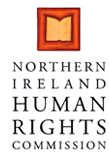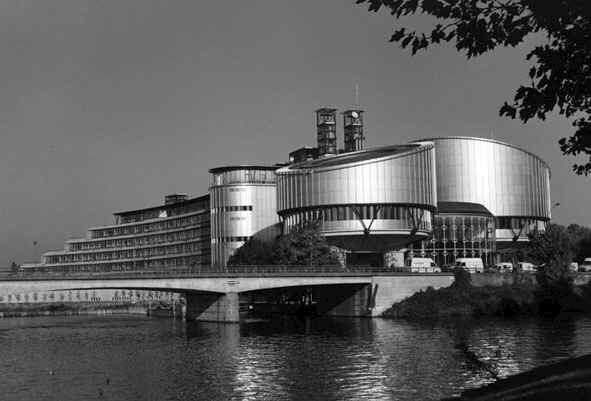Evaluation of human rights training for new police officers in Northern Ireland - Combating racism in Europe - Co-ordination of EU-funded resettlement project - Visits with Anti-Torture Watchdog - On Line Manual for Human Rights Defenders - Audit of Human Rights Policy in Ireland
 This project is being conducted by HRC on behalf
of the Northern Ireland Human
Rights Commission.
This project is being conducted by HRC on behalf
of the Northern Ireland Human
Rights Commission.
An evaluation of the Student Officer Training Programme (SOTP) was published by the Commission in November 2002. To download the full text of the SOTP evaluation in Word format from the Commission's website click here.
HRC's evaluation of the next step in the training of the new police officers - the Probationer Training Programme (PTP) - was published by the Commission in March 2004. For further details about the PTP evaluation click here.
Having regard to the key benchmarks identified in national and international standards on police training, the SOTP and PTP evaluations focus on three main themes:
police training and the rule of law, including an analysis of the extent to which the SOTP adopts a problem-orientated approach and mainstreams human rights issues into the training provided;
openness / transparency, including the issues of co-operation by the PSNI, external input into the course and the physical environment in which it is delivered;
quality assurance / quality enhancement, including the development of effective procedures to audit the integration of human rights issues into the training which is provided.
An HRC evaluation of the next stage in the training of new police officers - the Tutor Officer Scheme - is about to begin, and is expected to be completed by Autumn 2004.
 The European Commission
against Racism and Intolerance (ECRI) was set up following a decision
of the 1st Summit of Heads of State and Government of
the member States of the Council of Europe, held in Vienna in
October 1993, and strengthened by a decision of the 2nd
Summit held in Strasbourg in October 1997. ECRI's task is to
combat racism, xenophobia, antisemitism and intolerance at the
level of greater Europe and from the perspective of the
protection of human rights.
The European Commission
against Racism and Intolerance (ECRI) was set up following a decision
of the 1st Summit of Heads of State and Government of
the member States of the Council of Europe, held in Vienna in
October 1993, and strengthened by a decision of the 2nd
Summit held in Strasbourg in October 1997. ECRI's task is to
combat racism, xenophobia, antisemitism and intolerance at the
level of greater Europe and from the perspective of the
protection of human rights.
ECRI commissioned Human Rights Consultants to conduct an independent review of the substantive work that it has undertaken over the last four years. HRC’s review covers ECRI’s country-by-country work, its work on general themes and its relations with civil society.
Photo: © Council of Europe
The review was completed in 2003, and was launched by ECRI at an international event in Strasbourg in March 2004. For further details about the launch of this publication click here.
Co-ordination of EU-funded resettlement project
 Human Rights
Consultants has been awarded a contract to provide the National
Co-ordinator for a major EU-funded resettlement project: the MORE
project. HRC partner Sophie Magennis will perform this role until Spring
2005.
Human Rights
Consultants has been awarded a contract to provide the National
Co-ordinator for a major EU-funded resettlement project: the MORE
project. HRC partner Sophie Magennis will perform this role until Spring
2005.
MORE - Modelling of National Resettlement Process and Implementation of Emergency Measures
The MORE Project is co-funded by the EU's European Refugee Fund and the project partners are: the Ministry of Labour, Finland and the Reception and Integration Agency, Ireland, in co-operation with ECRE, IOM and UNHCR.
Resettlement involves the transfer of a refugee to a new safe host country, where he or she is accorded full protection guarantees, including legal residence, allowing the refugee to integrate in the national community. The primary objective of the MORE project is to develop comprehensive resettlement models, which can be used by European Union member States and other countries. Development of these models involves researching current practices in the resettlement field and identifying examples of best practice. The best practice models will address all aspects of the resettlement process.
Preparatory work on the project has begun, and activities will continue until Spring 2005. Project activities, including research, training and capacity building will be undertaken at the national and international level and will involve the participation of actors from all sectors engaged in the resettlement area. Further information about the project can be found on its website: www.more.fi.
MORE Project Partners
![]()




![]() The European Committee for the Prevention of Torture
and Inhuman or Degrading Treatment or Punishment (CPT) is a Council of
Europe treaty body which has extensive powers to carry out visits
to places where persons are deprived of their liberty. The
Committee's role is to strengthen the protection of such persons
against torture and inhuman or degrading treatment or punishment.
The European Committee for the Prevention of Torture
and Inhuman or Degrading Treatment or Punishment (CPT) is a Council of
Europe treaty body which has extensive powers to carry out visits
to places where persons are deprived of their liberty. The
Committee's role is to strengthen the protection of such persons
against torture and inhuman or degrading treatment or punishment.
During the period 2001 to 2003, Mark Kelly of HRC has assisted CPT delegations as an expert during on-site visits to places of detention in the following Council of Europe member States:
![]() This
project was developed for Front Line, the International
Foundation for the Protection of Human Rights Defenders. Front
Line identifies and monitors human rights defenders whose lives
are in danger and offers them solidarity and protection in a
number of ways. One of Front Line's goals is to show human rights
defenders how to use international instruments to help protect
themselves. To this end, HRC was commissioned to produce a
user-friendly, internet-based, manual designed to equip human
rights defenders to make more effective use of international
human rights mechanisms and procedures.
This
project was developed for Front Line, the International
Foundation for the Protection of Human Rights Defenders. Front
Line identifies and monitors human rights defenders whose lives
are in danger and offers them solidarity and protection in a
number of ways. One of Front Line's goals is to show human rights
defenders how to use international instruments to help protect
themselves. To this end, HRC was commissioned to produce a
user-friendly, internet-based, manual designed to equip human
rights defenders to make more effective use of international
human rights mechanisms and procedures.
The manual takes the form of a right-by-right compendium, which identifies the possible courses of action open to human rights defenders under relevant universal and regional human rights mechanisms and procedures.
The manual was launched at an international conference in Dublin on 17 January 2002. It can be consulted on the Front Line website by clicking here.
HRC Consultants: Sophie Magennis and Mark Kelly
 This
project was conducted on behalf of Amnesty International (Irish Section). The audit assesses both
the substantive content and the implementation of human rights
policy in Ireland. The assessment is based on an examination of
compliance by Ireland with international obligations in respect
of foreign and domestic policy and practice, falling within the
mandate of Amnesty International. The audit focuses on the
management of human rights policy in Ireland in order to identify
strengths and weaknesses and propose recommendations for
improvement.
This
project was conducted on behalf of Amnesty International (Irish Section). The audit assesses both
the substantive content and the implementation of human rights
policy in Ireland. The assessment is based on an examination of
compliance by Ireland with international obligations in respect
of foreign and domestic policy and practice, falling within the
mandate of Amnesty International. The audit focuses on the
management of human rights policy in Ireland in order to identify
strengths and weaknesses and propose recommendations for
improvement.
In its examination of domestic policy, the audit assesses the protection of basic human rights in Ireland against the benchmark of clearly defined and applicable international human rights law and standards. The degree to which domestic law and practice comply with international human rights law is evaluated with a view to informing future policy developments and improving mechanisms for the implementation of ‘human rights compliant’ domestic policy. Foreign policy is assessed with a view to evaluating the Irish Government’s commitment to human rights and clearly identifying the nature of the State’s obligation to promote and protect human rights abroad.
The audit was launched by Amnesty International in Dublin on 30 April 2001. Click here to read it.
Principal HRC Consultant: Sophie Magennis